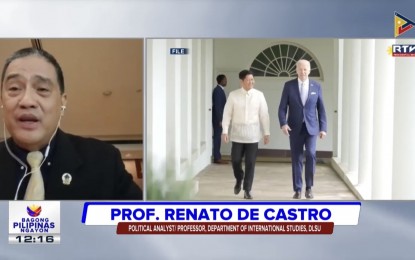
HISTORIC SUMMIT. De La Salle University professor Renato De Castro talks about the first-ever trilateral summit between the Philippines and its allies, the United States and Japan, during the Bagong Pilipinas Ngayon public briefing on Thursday (April 11, 2024). He said the US will continue to honor its commitments to its allies in the Indo-Pacific region despite a possible leadership change brought by its presidential elections later this year. (PTV Facebook Screengrab)
MANILA – The United States (US) will continue to honor its commitments to its allies in the Indo-Pacific region that are facing the "expansive and aggressive" behavior of China, including the Philippines, despite a possible leadership change brought by its presidential elections later this year, a political analyst said.
Noting the US government’s “bipartisan consensus,” professor Renato De Castro, a political analyst and professor of the Department International Studies of the De La Salle University, said Washington will maintain its foreign policy, particularly in the Indo-Pacific, regardless of who wins the US presidential elections this November.
President Joe Biden, a member of the Democratic Party, and his predecessor Donald Trump of the Republican Party are set for another election showdown this November. Biden defeated Trump in 2020.
“Pagdating sa foreign policy issue na ho ‘yan, nagkakasundo ang mga Amerikano. Kumbaga ang consensus nila, dapat nating tulungan ang bansa sa Indo-Pacific region na of-course hinaharap ang pananakop at panggigipit ng Tsina (When it comes to that foreign policy issue, Americans agree. It seems that their consensus is that we should help the countries in the Indo-Pacific region that is, of course, in the face of China's expansionism and pressure),” De Castro said in an interview over the Bagong Pilipinas Ngayon public briefing.
“Sa larangan na po na ‘yan (In that aspect), I’m confident na merong (that there will be) continuity when it comes to issues like these,” he added.
The US is hosting a landmark trilateral summit with the Philippines and Japan, where Biden, President Ferdinand R. Marcos Jr. and Japanese Prime Minister Fumio Kishida are expected to meet and strengthen cooperation in key areas including maritime security.
Over the weekend, the three allies, along with Australia, held a quad naval exercise in the West Philippine Sea, which forms part of the South China Sea, a vast waterway that is being claimed entirely by China.
In 2016, the Permanent Court of Arbitration in The Hague ruled that China’s claims had no legal basis, a decision Beijing has vehemently rejected.
De Castro said joint exercises such as the historic quad naval exercise are pivotal to the Armed Forces of the Philippines’ (AFP) continued capacity development, especially in addressing territorial threats.
“Nahahasa ho iyong capacity ng Armed Forces natin para sa maritime security at of course sa territorial defense and at the same time, nagkakaroon tayo ng interoperability – kaya natin mag-operate hindi lang with the United States pati with the Japanese Self-Defense Force, pati pumasok na rin iyong Australia at hindi ko idi-discount iyong possibility na nandyan rin ang Republic of Korea at of course India (Our Armed Forces is being sharpened for maritime security and, of course, territorial defense and at the same time we are developing interoperability, which means we can operate not only with the United States but also with the Japanese Self-Defense Force, and Australia also entered the activity, and I will not discount the possibility that the Republic of Korea and of course India will come in soon),” De Castro said.
Economic cooperation
While maritime security and defense cooperation is among the expected highlights of the first-ever trilateral summit, De Castro also emphasized the economic perks and investments that the country will receive in the landmark meeting.
De Castro said he expects the countries’ respective leaders to explore ways to advance cooperation in key areas, including infrastructure, semiconductors, and critical minerals, adding that these would generate “quality jobs” for Filipinos.
“Malaking bagay iyan sa ating ekonomiya – hindi na tayo magpapadala ng mga Pilipino para magtrabaho sa abroad dahil nandito na ang trabaho kapag talagang na-realize natin iyong goal na nakasaad doon sa economic agenda nila dito sa Trilateral Summit (This big for our economy - we will no longer have to send Filipinos to work abroad because the jobs will be here if we really realize the goal stated in the economic agenda of the Trilateral Summit here)” he said.
Philippine Ambassador to the US Jose Manuel Romualdez said the country stands to receive about USD100 billion in investments in the next five to 10 years as a result of the trilateral summit in Washington, D.C. (PNA)
